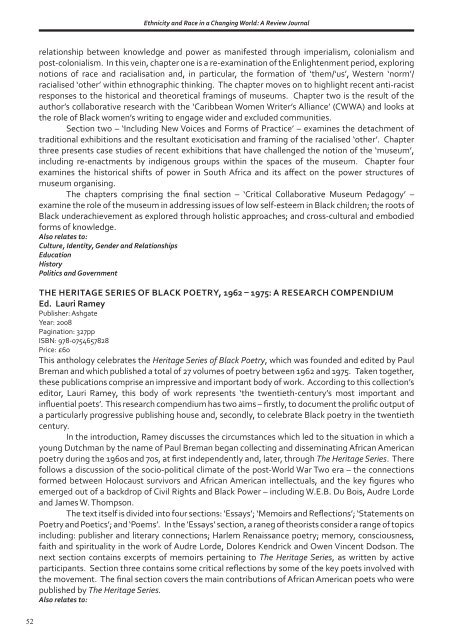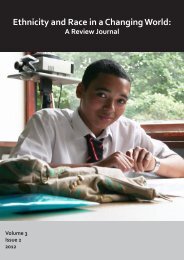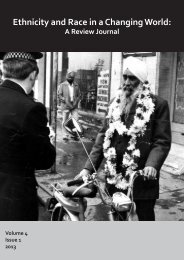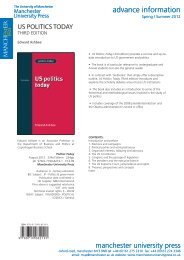Ethnicity and Race in a Changing World
Volume 2, Issue 1, 2010 - Manchester University Press
Volume 2, Issue 1, 2010 - Manchester University Press
- No tags were found...
Create successful ePaper yourself
Turn your PDF publications into a flip-book with our unique Google optimized e-Paper software.
<strong>Ethnicity</strong> <strong>and</strong> <strong>Race</strong> <strong>in</strong> a Chang<strong>in</strong>g <strong>World</strong>: A Review Journalrelationship between knowledge <strong>and</strong> power as manifested through imperialism, colonialism <strong>and</strong>post-colonialism. In this ve<strong>in</strong>, chapter one is a re-exam<strong>in</strong>ation of the Enlightenment period, explor<strong>in</strong>gnotions of race <strong>and</strong> racialisation <strong>and</strong>, <strong>in</strong> particular, the formation of ‘them/‘us’, Western ‘norm’/racialised ‘other’ with<strong>in</strong> ethnographic th<strong>in</strong>k<strong>in</strong>g. The chapter moves on to highlight recent anti-racistresponses to the historical <strong>and</strong> theoretical fram<strong>in</strong>gs of museums. Chapter two is the result of theauthor’s collaborative research with the ‘Caribbean Women Writer’s Alliance’ (CWWA) <strong>and</strong> looks atthe role of Black women’s writ<strong>in</strong>g to engage wider <strong>and</strong> excluded communities.Section two – ‘Includ<strong>in</strong>g New Voices <strong>and</strong> Forms of Practice’ – exam<strong>in</strong>es the detachment oftraditional exhibitions <strong>and</strong> the resultant exoticisation <strong>and</strong> fram<strong>in</strong>g of the racialised ‘other’. Chapterthree presents case studies of recent exhibitions that have challenged the notion of the ‘museum’,<strong>in</strong>clud<strong>in</strong>g re-enactments by <strong>in</strong>digenous groups with<strong>in</strong> the spaces of the museum. Chapter fourexam<strong>in</strong>es the historical shifts of power <strong>in</strong> South Africa <strong>and</strong> its affect on the power structures ofmuseum organis<strong>in</strong>g.The chapters compris<strong>in</strong>g the f<strong>in</strong>al section – ‘Critical Collaborative Museum Pedagogy’ –exam<strong>in</strong>e the role of the museum <strong>in</strong> address<strong>in</strong>g issues of low self-esteem <strong>in</strong> Black children; the roots ofBlack underachievement as explored through holistic approaches; <strong>and</strong> cross-cultural <strong>and</strong> embodiedforms of knowledge.Also relates to:Culture, Identity, Gender <strong>and</strong> RelationshipsEducationHistoryPolitics <strong>and</strong> GovernmentTHE HERITAGE SERIES OF BLACK POETRY, 1962 1975: A RESEARCH COMPENDIUMEd. Lauri RameyPublisher: AshgateYear: 2008Pag<strong>in</strong>ation: 327ppISBN: 978-0754657828Price: £60This anthology celebrates the Heritage Series of Black Poetry, which was founded <strong>and</strong> edited by PaulBreman <strong>and</strong> which published a total of 27 volumes of poetry between 1962 <strong>and</strong> 1975. Taken together,these publications comprise an impressive <strong>and</strong> important body of work. Accord<strong>in</strong>g to this collection’seditor, Lauri Ramey, this body of work represents ‘the twentieth-century’s most important <strong>and</strong><strong>in</strong>fluential poets’. This research compendium has two aims – firstly, to document the prolific output ofa particularly progressive publish<strong>in</strong>g house <strong>and</strong>, secondly, to celebrate Black poetry <strong>in</strong> the twentiethcentury.In the <strong>in</strong>troduction, Ramey discusses the circumstances which led to the situation <strong>in</strong> which ayoung Dutchman by the name of Paul Breman began collect<strong>in</strong>g <strong>and</strong> dissem<strong>in</strong>at<strong>in</strong>g African Americanpoetry dur<strong>in</strong>g the 1960s <strong>and</strong> 70s, at first <strong>in</strong>dependently <strong>and</strong>, later, through The Heritage Series. Therefollows a discussion of the socio-political climate of the post-<strong>World</strong> War Two era – the connectionsformed between Holocaust survivors <strong>and</strong> African American <strong>in</strong>tellectuals, <strong>and</strong> the key figures whoemerged out of a backdrop of Civil Rights <strong>and</strong> Black Power – <strong>in</strong>clud<strong>in</strong>g W.E.B. Du Bois, Audre Lorde<strong>and</strong> James W. Thompson.The text itself is divided <strong>in</strong>to four sections: ‘Essays’; ‘Memoirs <strong>and</strong> Reflections’; ‘Statements onPoetry <strong>and</strong> Poetics’; <strong>and</strong> ‘Poems’. In the ‘Essays’ section, a raneg of theorists consider a range of topics<strong>in</strong>clud<strong>in</strong>g: publisher <strong>and</strong> literary connections; Harlem Renaissance poetry; memory, consciousness,faith <strong>and</strong> spirituality <strong>in</strong> the work of Audre Lorde, Dolores Kendrick <strong>and</strong> Owen V<strong>in</strong>cent Dodson. Thenext section conta<strong>in</strong>s excerpts of memoirs perta<strong>in</strong><strong>in</strong>g to The Heritage Series, as written by activeparticipants. Section three conta<strong>in</strong>s some critical reflections by some of the key poets <strong>in</strong>volved withthe movement. The f<strong>in</strong>al section covers the ma<strong>in</strong> contributions of African American poets who werepublished by The Heritage Series.Also relates to:52






